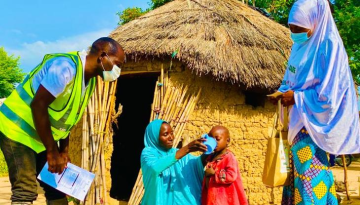Malaria Consortium’s seasonal malaria chemoprevention programme awarded ‘top charity’ status by GiveWell for a sixth year running
26 November 2021
Malaria Consortium is pleased to announce that our seasonal malaria chemoprevention (SMC) programme has been awarded ‘top charity’ status by GiveWell for the sixth year in a row.
GiveWell, a US-based non-profit organisation that conducts in-depth research to determine ‘how much good’ a charity programme accomplishes for every dollar spent, selects top charities each year, with Malaria Consortium’s seasonal malaria chemoprevention (SMC) programme recognised again as a highly cost-effective intervention for averting deaths from malaria.
“We are delighted to once again be named one of GiveWell's top charities for our SMC programme,” said Malaria Consortium Chief Executive Charles Nelson. “Thanks to their support we’ve been able to expand the number of children reached with SMC year-on-year, reaching an estimated 12 million children in 2021 with philanthropic funding and around 20 million children across funding streams. SMC continues to be a highly effective tool in the fight against malaria in the Sahel, while exciting new research could confirm more geographies as eligible in the future. The support of GiveWell means we can continue to look at extending coverage to reach more children and carry out further studies to ensure the intervention remains effective.”
Malaria Consortium’s SMC programme focuses on preventing malaria in some of those who are most vulnerable to the disease - children under five years - during the rainy season in the Sahel region of Africa. Most malaria illness and deaths occur during this peak malaria transmission. SMC involves administering monthly courses of antimalarial drugs during the period of highest risk.
The scale-up of SMC since WHO recommended the intervention for use in the Sahel region in 2012 has been widely acknowledged as a success story, with national governments and the wider malaria community increasingly focused on the future of SMC, how it can be adapted to different contexts, and which innovations can be introduced to maximize its impact in the global fight against malaria.
“We’re continuing to expand the evidence base for SMC through research, monitoring and evaluation, paving the way for seasonal malaria chemoprevention to continue to be an effective tool in preventing deaths in the future,” said Christian Rassi, Malaria Consortium’s SMC Programme Director. “Encouraging results from the first phases of our research exploring the feasibility and impact of SMC in Uganda and Mozambique underline the potential for this intervention to save many more lives across Africa.”
Malaria Consortium began implementing SMC in 2013 and led the rapid scale-up of the intervention through our Unitaid-funded ACCESS-SMC project in 2015. Although this project ended in 2018, the organisation has continued supporting the delivery and scale up of SMC in Burkina Faso, Chad, Nigeria and most recently in Togo, predominantly with support from philanthropists influenced by GiveWell’s ‘top charity’ status.
You can learn more about Malaria Consortium’s SMC programme on our dedicated page.
For more information about GiveWell’s recommendation, visit their website.
Latest news
- International summit calls for AMR accountability in public health interventions21st March 2024
- Global SMC community celebrates new milestone at SMC Alliance Annual Meeting in Nigeria6th March 2024
- Scaling up key interventions could halve pneumonia-related childhood mortality13th February 2024
- Malaria Consortium and eGov Foundation join Mozambique’s national malaria programme to digitalise seasonal malaria chemoprevention campaigns8th February 2024
- World’s first malaria vaccine rollout launched in Cameroon22nd January 2024
- Digital solutions driving equitable access to health6th December 2023